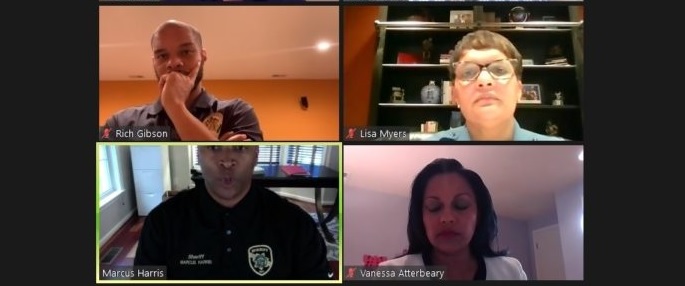Howard County’s top law enforcement officials – all African American – are warning the “defund the police” movement can lead to chaos and worry about the expense of body-cameras, at the same time they reject excessive use of force and racism in policing.
At a Zoom forum Wednesday night put on by the Columbia Democratic Club, Police Chief Lisa Myers said “defund the police” “is probably one of the worst things we can do right now.”
The Defund the Police “title is terrible and inappropriate,” said Howard County State’s Attorney Rich Gibson. “It would lead to chaos… We need the police force.”
Gibson was aware that “Defund the Police” for many of its advocates means taking some money for policing and using it for social services, mental health issues and other programs that can potentially reduce crime and violence. But he noted that 70% of Howard County’s budget goes into schools and other social services.
“Defund the police doesn’t work in this space,” Gibson said.
Myers said body-worn cameras are “a good tool in policing” but “it has a very steep cost” based on a 2017 pilot program in Howard County.
Gibson agreed that body cameras would be costly both for the police and for prosecutors who would have to add staff to process and view the videos. “Some things are worth the cost,” he said.
Maryland police forces may not have a choice, according to Del. Vanessa Atterbeary, a Howard County Democrat who heads a new House of Delegates task force on policing. “I’m pretty confident that body cameras are going to be mandated,” Atterbeary said.
Racial issues in policing
She and the other panel members were concerned about racial issues in policing. As the African American mother of two young boys, Atterbeary said, “It scares me.”
Gibson said he had personally experienced what he felt was racial bias, being pulled from a car he was driving. There is also a problem with the lack of diversity in law enforcement.
“There are not a lot of people who look like me” as prosecutors, Gibson said.
“We still struggle to find diverse applicants with the police department,” said Myers. “It’s been tough to attract minority applicants.”
Of Howard County’s 479 sworn officers, 12% are African American, 6% are Hispanic and 6% are of Asian heritage. The starting salary for police in Howard County is $57,000.
Use of force
All Howard County police are trained to use “the least amount of force,” Myers said. They are also trained “to speak and say something about excessive use of force” if they see it.
Complaints about the use of force by Howard County police are rare, as are complaints in general, according to the police department’s annual report, page 10.
The context for Wednesday’s discussion was obviously the police killing of George Floyd in Minneapolis and the reaction in huge protests across the country about “Black Lives Matter.”
Howard County Sheriff Marcus Harris, a retired Baltimore County police detective, said, “I could not watch the video” of the killing of Floyd. A Minneapolis officer held his knee on the neck of Floyd for 8 minutes 46 seconds.
Harris did see a photo. “I still get a little choked up.”
The sheriff in Howard County is an elected official, but unlike in other more rural counties where sheriff’s deputies act as the police force, their duties in Howard County are limited to serving the courts. Sheriffs and deputies are sworn officers like the police. They guard the courts, deliver warrants, transport prisoners, and other court functions.
There have been complaints about racial bias by a previous sheriff. But based on his experience, Harris said, “I think we have a lot more good police than we do bad.”
No-knock warrants
No-knock warrants, in which police break into homes and apartments without warning or announcing themselves, are one of the issues highlighted in recent protests. In March, Breonna Taylor in Louisville, Ky., an unarmed emergency room technician, was killed in her apartment by police who busted in with a no-knock warrant searching for drugs.
“There’s definitely a place for no-knock warrants,” Harris said. He had participated in many of them as an undercover officer in Baltimore County. Gibson said they were justified in some situations where suspects might destroy evidence.
Atterbeary, who is also vice-chair of the House Judiciary Committee, said, “I have some serious concerns about no-knock warrants.”
Incidents of police killing suspects are unusual in Howard County. Gibson emphasized that the county has a written agreement with the Montgomery County state’s attorney that they will investigate such incidents in Howard County, and Howard prosecutors will do the same for Montgomery County. Howard has investigated four such fatalities in Montgomery. There has been one case that occurred in Howard.
Click here for the full two-hour Zoom video of the panel discussion.




Recent Comments